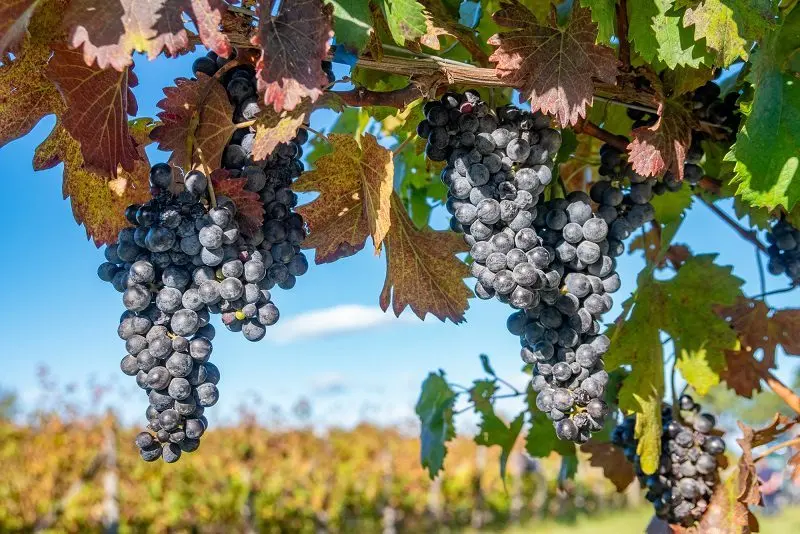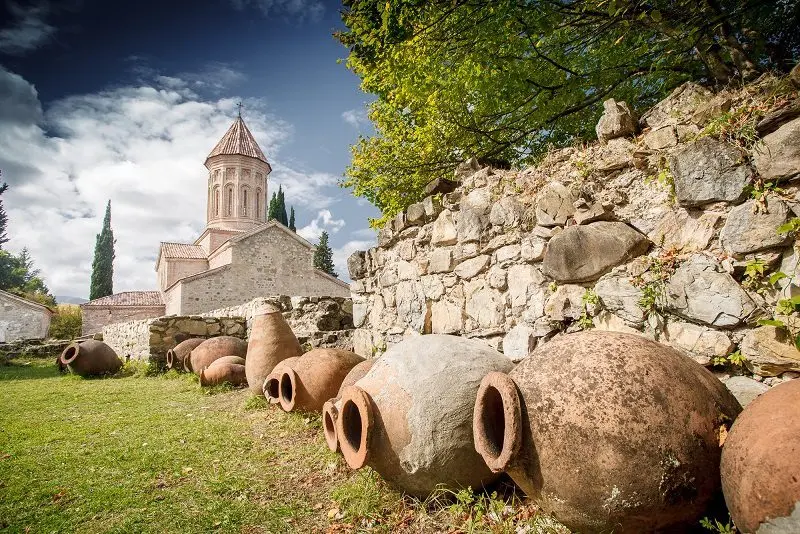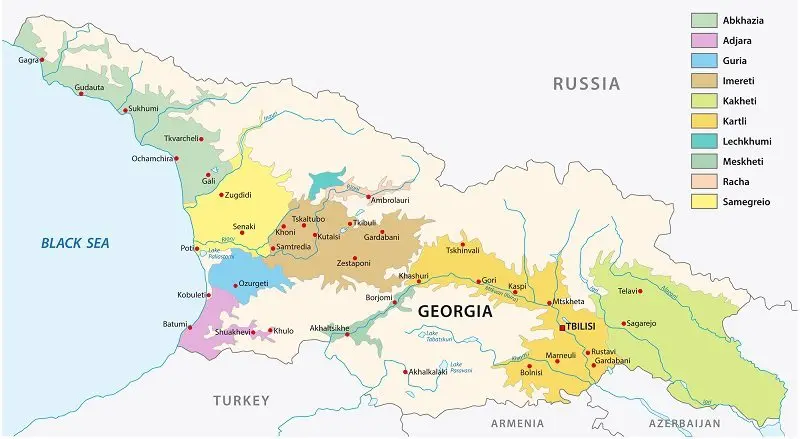The Georgians themselves call Mukuzani a wine with a complex, obstinate character. Its tasting is not rushed. Each sip consistently reveals the bouquet of the drink, which has a thick aftertaste, rich in oak and berry notes. The taste of Mukuzani, aged according to all the rules, has the classic structure of a dry wine: it has both viscosity, astringency, and velvety density, which for a long time envelops the receptors with spices of oak, spices, and a black-berry palette.
The dark color of Mukuzani best reflects the essence of the name of the grape from which it is produced. “Saperavi” is a dye, this is how the locals characterize the juice. Thick, dark garnet, almost does not transmit light, once on the fabric, it does not wash off, dripping onto the skin, it is not washed off for 2-3 days. Such is the color of the wine, retaining its tight richness even when diluted with water. The fortress of mature Mukuzani is from 10,5% to 12,5%, titratable acidity is 6,0-7,0 g/l.

Region
The highlights of Georgia’s winemaking are associated with Kakheti, a mountainous region where the best varieties of grapes are cultivated, and where 2 thirds of the country’s vineyards are located. Here, at the mouths of the Iori and Alazani rivers, the villages of Mukuzani and Teliani are located, which became the birthplace of the unique Saperavi variety. The region is famous not only for vineyards, but also for the number of centenarians, which in percentage terms exceeds this indicator in other regions of Georgia. The Kakhetians themselves believe that it is the unique properties of Saperavi and the drinks made from it that have become the cause of good health and longevity.
At home, Mukuzani wine is considered a masculine drink due to its thick, heavy texture. But the peasants gave it to children as the first remedy for anemia. And even today it is believed that black wine is the best remedy for the “pale infirmity” inherent in adolescents. It is recommended in small doses to people who have had influenza, pneumonia, weakened debilitating cough, beriberi.

Production technology
Grapes for Mukuzani are harvested by hand in September (this period is considered the most productive in terms of maturity and sugar content), cleaned of leaves and placed in whole clusters in a vat. All raw materials are subjected to extrusion – both the peel, and the bones, and the twigs that form the vine.
The resulting thick mass is poured into a “qvevri” – a traditional large-sized earthenware jug sunk into the ground. The fermentation process takes 4 months. The resulting young wine – “majari” – is filtered into oak barrels and aged for at least three years.

Long exposure is inherent in Mukuzani wine, only this variety of dark garnet color has an exquisite flavor blend of oak and fruit.
Production technology has left its mark on the aroma of wine. In Mukuzani, it is full-bodied, containing shades of all the constituent raw materials – the ripe sweetness of the pulp, the delicate nutmeg aroma of the skin, the tart flair of the stones, the spicy breath of vine branches. This nectar smells of bitter chocolate, ripe cherries, barely perceptible vanilla.
Popular producers of Mukuzani
For more than 100 years, the Georgian wine Mukuzani has been considered the standard of natural alcoholic beverages produced from Saperavi. The brand has won 14 international awards, including 9 medals of the highest standard. In 2010, the brand name added to the list of appellations – regions where the origin of wines is controlled by geographical location, in other words, is the author’s.

To date, well-known manufacturers of Mukuzani are:
- “Dugladze Wine Company” owns 290 hectares of vineyards in Kakheti, produces 1500 bottles of fine wine per hour, exports products to the Baltic countries, the CIS, Eastern Europe and Asia.
- The Besini company, which has been operating since 2004. The production owns 125 vineyards in Kakheti, which allows processing at least 2 thousand tons of raw materials annually. Sandro Khatiashvili, who is the leading expert of the Russian Sommelier School, the company’s vintage wines were recognized as the best in the premium class category.
- “Brothers Askaneli” – a family winery, originating in 1880. The company honors centuries-old traditions, thoroughly observes technologies, which makes the products of this brand in demand in Germany, Finland, Great Britain and other countries of the world community.
- Marniskari has been producing wine since 1875. The founder of the family winery, Zakharia Djordjadze, developed his own methods, which later became the basis for modern technologies used by the company. The merit of “Marniskari” is not only in observing traditions and careful attitude to ancient recipes that are a national treasure, but also in the revival of lost grape varieties.
- Badagoni is a winery that has been producing Georgian wines since 2006. The production belongs to the winemakers of Georgia and Italy, which made it possible to embody the best Kakhetian traditions and latest generation technologies in products.
How to drink Mukuzani
Georgian red wines open at a serving temperature of 18 to 20 degrees. Mukuzani and here “shows temper”, preferring lower rates. The optimum temperature for its tasting is from 12 to 16 degrees, so be sure to remove the bottle from the refrigerator or cellar an hour before the feast.

The thick texture of the drink requires an appropriate gastronomic accompaniment. These are traditional meat dishes of Georgian cuisine, barbecue and just meat cooked on an open fire, boiled pork, ham, basturma, spicy hot appetizers. Diversify your meal with fresh herbs, homemade Georgian cheese, serve meat with Tkemali sauce, hot pita bread.









